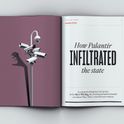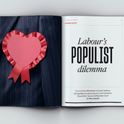How low can you go?
Dominic Grieve rightly suggests that the Conservative Party’s reputation as a responsible governing force is threatened by recent events such as the Owen Paterson standards row, the Priti Patel bullying scandal and claims about Downing Street parties which have since engulfed the government.
But it would be shortsighted for the Conservative Party’s opponents to view this as a cause for celebration. By reinforcing some of voters’ worst suspicions about politicians’ honesty and integrity, such episodes potentially drag down the whole reputation of politics. And as citizens become more cynical and disengaged, democracy becomes increasingly fragile, making it more difficult for any group to govern with public consent. Such a direction of travel should deeply trouble not only all politicians, but all democrats.
So what can be done? The regulatory framework could clearly be strengthened, as recently proposed by the Committee on Standards in Public Life. Some regulators need further support—the Electoral Commission’s independence is currently threatened, and propriety recommendations by the House of Lords Appointments Commission have been flouted. There is pressure now for new mechanisms to enforce truthfulness in parliament. Recent research by the UCL Constitution Unit suggests that the public, disenchanted as it is with politicians, might well strongly support such moves. Hence those vying to succeed Boris Johnson, both within his party and in opposition parties, could benefit from supporting them.
But while the obvious way to clamp down on misbehaviour is through new rules, this can never be enough. The extent to which a written constitution is no guarantee is visible in the likes of the US, Hungary and Poland. Whatever the formal rules, politicians have responsibilities as key guardians of our institutions, and of the robustness of our democratic systems. When they lose sight of this we need to worry.
Meg Russell, director of the UCL Constitution Unit
A paper’s power
Jane Martinson’s thorough piece on the defenestration of Geordie Greig as editor of the Mail was illuminating reporting, a cut above the gossip that often serves as analysis of the media.
But is it surprising that Greig has gone, or that Paul Dacre is back running the paper’s parent company? Thwarted in his desire to control the modern world of communications at Ofcom, Dacre needed some empire where he could go on wielding his uncanny brilliance to threaten, control, harm and shape. With authority collapsing right at the centre of government, wresting the Mail back to its toxic agenda is more urgent. Greig was simply too critical of the populists in Downing Street.
I witnessed the power of the Mail in 1996, when I helped deliver workshops preparing the inexperienced Labour shadow Cabinet for government. Whatever we raised, the one injunction anxious civil servants wanted to impress on the aspirant ministers was that they should not let the Daily Mail run the agenda every day. In Martinson’s piece, Jeremy Hunt describes this power as “one of the great mysteries of British politics.” Yet as the Mail’s reach has declined, its need to compensate by exercising power has grown. As news fragments, calling the shots is still surprisingly useful commercially and politically.
Martinson astutely observes that the Mail newspaper’s agenda is more political than MailOnline, while the money is in digital. But perhaps we need to pause. Are they genuinely so separate? MailOnline—with its celebrity obsessions, foul-mouthed attack dog weirdness and capacity to denigrate reality in pursuit of profit—is surely the twin of the Mail. Democracies depend on what people know and what they think is important. MailOnline peddles ignorance, stoking its users’ prejudices while holding them in contempt. Fodder, then, for the Mail.
Jean Seaton, professor of media history at the University of Westminster
Byline bias
I’d like to offer a quick bit of feedback from a first-time reader, if I may. I was disappointed to see Jason Thomas-Fournillier described solely by his asylum status in your list of contributors (Jan/Feb), which seemed unkindly reductive when everyone else was described by their profession. Presumably Jason has a profession, or had one before he was forced to seek asylum. Either way, I am sure he is much more than just a temporary immigration status.
I’m going to keep the faith and keep turning the pages. I am pleased to have discovered Prospect and agree you occupy a vital space “in a desert of information chaos.” I remain optimistic.
Jessica Tickell, Loughborough
Absence of care
Our family is one of the “lockdown casualties.” Our elder son (now 16) has severe autism, requiring constant supervision and a stable and predictable routine. Instead, we were abandoned without his special school and various other services for several months from March 2020, with catastrophic and lasting results. We have suffered a huge increase in signs of distress such as violent meltdowns, obsessive behaviour, perennial spitting, and refusal to eat almost anything except chocolate.
After two years of pain, the respite care on which we depend has been halved due to a national shortage of care staff. Councils and government must work together to rapidly fix this crisis and give families like ours some chance to repair the damage they have caused.
Name supplied, Exeter
The oldest hatred
David Renton is surely right to call for an anti-racist politics that “treats all forms of racism to the same unforgiving hostility,” whether the victims are Jewish, black, or of Asian origin. All racism is bad.
But here we differ. Renton seems to think that under Keir Starmer, the Labour leadership’s factional opponents have been subjected to reams of vile abuse. He gives only one detailed example of a Jewish supporter of Jeremy Corbyn who has come under attack and quotes two troubling emails attacking black pro-Corbyn MPs.
Meanwhile, as he himself acknowledges, antisemitism on the left hasn’t gone away, in the trade unions or in the Labour Party itself. Jewish students still feel under threat at many universities; at the 2021 Labour conference many of those who cheered the Jewish former MP Louise Ellman were the same delegates who cheered Corbyn just two years ago; and Israel is still vilified by people who ignore the expulsion of Jews from large parts of the postcolonial world.
David Herman, southwest London
Norway now
Along with Janet Burgess, a great many of us believe it highly desirable that the UK should rejoin the European single market and customs union before too long; Great Britain (though not Northern Ireland) is currently the only territory in the whole of western and central Europe to be outside both.
The real irony is that longstanding proponents of leaving the European Union always advocated moving to a similar situation to Norway, outside the political institutions of the EU but retaining all the advantages of single market membership. Despite her initial “citizens of nowhere” rhetoric, Theresa May was, I believe, moving towards this position until she was stabbed in the back by Boris Johnson and others, leaving the road clear for what can only be described as a coup by an ideological cult, often motivated by a barely concealed xenophobia. Since then we have seen political minnows like Liz Truss hailing as great national triumphs trade deals that simply replicated what we had been enjoying for years anyway.
A future government, even a Conservative one, will probably find it economically necessary to move towards what has for years been described as the “Norway option.” Let us hope that the aforementioned ideological cult will not be allowed to stand in the way.
Alan Pavelin, Kent
Written out
In his essay on The Owl and the Nightingale, Nick Spencer locates Simon Armitage in a tradition of writers reworking medieval poetry made up of Seamus Heaney, Bernard O’Donoghue and Matthew Francis.
Armitage has tremendous artistic skill. But this list ignores the innovative contributions of poets and authors such as Patience Agbabi, whose collection Telling Tales, a 21st-century remix of Chaucer’s Canterbury Tales, was shortlisted for the Ted Hughes Prize in 2015, and Zadie Smith, whose reworking of the Wife of Bath as the Wife of Willesden was recently performed at the Kiln Theatre in London. Arguably, both writers do as much as Heaney et al to “bring medieval poetry to contemporary audiences” (as Spencer puts it).
Even if the earliest centuries of English literary culture were dominated by white men, there’s no justification for ignoring the work of women of colour today.
Diane Watt, author of “Women, Writing and Religion in England and Beyond, 650-1100”
Selective sharia
Mustafa Akyol has found a way of tackling illiberal sharia: simply consign its illiberal bits to history and foreground its liberal ones. Divine this purer sharia based on universal principles and, he argues, you have something which aligns with western notions of freedom, democracy and human rights.
Yet Akyol’s hackneyed blueprint for reform shows how liberal Islam fails in its project to remodel sharia. Mining Islam for values that fit modern liberal sensibilities is easily done if you read history through a looking glass. Retrieving Islam for the opposite ends is also possible. You end up in a non-debate between the two sides, forged largely in the post-9/11 knowledge industry. It is both circular and banal.
Yet the real object of Akyol’s concern is not illiberal sharia, but that today’s nation states have become crucibles for a secularised politics of power, provoking authoritarian Islamists into disavowing the decentralising “patchwork” of pre-modern Islam.
For Akyol, the key is to recognise that interpretations of sharia are “not fully divine and eternally applicable, but partly human and deeply historical.” Unfortunately for him, so are his own.
Zaheer Kazmi, Queen’s University Belfast
Path to progress
I read with great interest Jonathan Rée’s item about the philosopher Richard Rorty. Rorty came to believe that social progress should be seen as the expansion of social solidarity. He therefore declared himself an advocate of a democracy in which all sorts of people and ideas might equally find a place and flourish.
As Rée says, Rorty pointed out that the immiseration of the masses was “likely to culminate in a bottom-up populist revolt.” Rorty was American and, some years later, voilà, Donald Trump.
Far be it from me to suggest we have Trumpism here! I might say, however, that since we have a situation here similar to that which led to Trump, opposition parties could now put their heads together in Rorty’s “experimental frame of mind,” in the hope of finding new ways of doing politics.
Edwin Abbott, via email
Unnatural wonder
Emily Lawford highlights the wonderful strangeness of coral and the fact it is “animal, vegetable and mineral.” To ensure a future for the world’s reefs, we may need to add artificially to this list of attributes.
It has taken millennia for today’s coral species to evolve, and even best-case scenarios for global heating would see many exposed to annual or near-annual heat stress, too frequent for coral’s natural resilience to cope with. Short-term solutions could involve engineering artificial structures, or 3D printing plastic reefs. But assisted evolution may be the only way to preserve the majority of the world’s coral.
There are several possibilities: stress conditioning, which would induce heritable physiological changes by exposing lab-grown corals to future climate conditions; accelerating the exchange of genes between more and less heat-resilient species; or breeding hardier strains of the microalgae which nourish corals and provide their vivid colours. In the future, it may even be possible to manufacture gene-edited mutant coral that is adapted to survive the Anthropocene ocean. Each method would leave a distinct human fingerprint on coral genomes.
Lawford notes that “the looming catastrophe is human as well as environmental.” Perhaps part of the solution is for us to become more like coral, whose cooperative living strategies allow up to a quarter of marine life to flourish. Otherwise, we may need to consider which better describes the little coral we have left: animal, vegetable and mineral; or mechanical, synthetic and farmed.
David Farrier, author of “Footprints: In Search of Future Fossils”
Leave off
Sheila Hancock attributes the aggro building up between us and Europe as being egged on by “mindless little Englanders” by which term I assume she refers to me and millions of others who voted for Brexit.
I, like her, recall the devastation caused by the Second World War, not only in England but also in Cologne and Wilhelmshaven, where I lived as a child. I do not know if she means to imply that people who voted for Brexit are warmongers, but if so that suggestion is as offensive as it is ignorant. The reason I and many others voted to leave was the EU’s failure to address its longstanding democratic deficit, not from a motive of outdated chauvinism.
I have always admired Sheila Hancock as an actor. Notwithstanding my words above I wish her well in the journey ahead.
DB Northrop, Hertfordshire
In fact
In 1997, 52 per cent of UK children played the recorder. Now 15 per cent do, while the number playing the ukulele at school is up from 1 per cent in 2014 to 15 per cent.
ABRSM Making Music Report 2021
Out of the 780 people brought to the Guantanamo Bay detention centre, 39 are still there; it costs $540m per year to keep the facility open, or $14m per detainee.
Lawfare, 11th January 2022
In 2021, TikTok surpassed Google as the world’s most popular domain.
CNet, 12th January 2022
The number of African countries that are dependent on commodities (defined as share of physical exports) has risen to 83 per cent, from 77 per cent a decade ago.
Economist, 8th January 2022
In the English language, V is the only letter that is never silent.
@qikipedia, 15th December 2021
There are at least 2,500 beehives in Paris, and 7,500 in London—an unsustainable amount given the scarcity of city flowers.
Bloomberg, 7th January 2022
Of the 32 head coaches in the NFL, the top-flight American football league, nine are either the son or the father of a current or former NFL coach of some kind.
Defector, 3rd January 2022
In 2019, 80.7 per cent of North Koreans defecting to South Korea were female.
Financial Times, 12th January 2022
If you were born in 1985 or later, you have never lived through a month in which the global temperature is cooler than the average of that month over the whole of the 20th century.
Washington Post, 13th January 2022
During Tim Cook’s 10 years as CEO, Apple’s market value has grown by more than $700m a day.
@PatrickMcGee_, 7th January 2022
In 1932, Charlie Chaplin was on a trip to Japan when its prime minister Inukai Tsuyoshi was assassinated. The killers hoped to murder Chaplin as well, to start a war with the US, but he and the PM’s son had gone to watch a sumo wrestling match.
Hollywood Reporter, 6th January 2022













